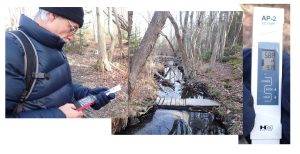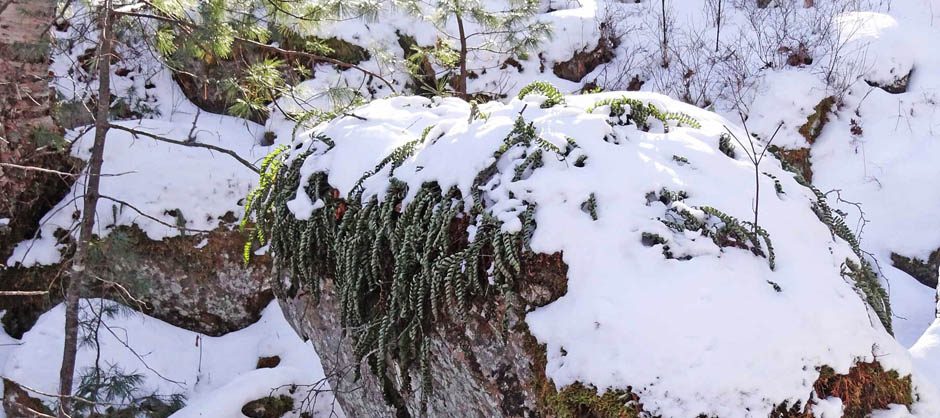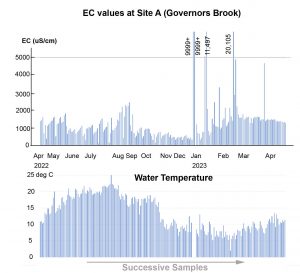
Charles Bull records water EC and temperature at Governors Brook on Nov 30, 2022.
Click on image for larger version
Governors Brook, originating near Herring Cove Road, feeds into Colpitt Lake (unsettled), which in turn drains into the partially settled Williams Lake.* A study conducted in December of 2015 suggested that Governors Brook/Colpitt Lake is the major source of salt entering Williams Lake, also that some “salt stratification” was occurring in Williams Lake. Salt stratification is a concern because it can lead to impaired turnover of the lake in spring and the associated re-oxygenation of the deeper waters.
*Both lakes occur in the Williams Lake Watershed, a large part of which lies within the ‘Backlands’ (see Watersheds)
At the recent AGM for the Williams Lake Conservation Company, Charles Bull reported on his “citizen science” monitoring of water EC (electrical conductivity, a measure of salt concentration) and temperature on a near-daily basis at a site on the upper reach of Governors Brook. He also sampled intermittently at the mouth of Governors Brook on Colpitt Lake, and at the top of the un-named stream that flows from Colpitt lake to Williams Lake.
Charles completed a full year of observations on April 19, 2023. A perhaps unfortunate highlight of his observations: on each of 4 individual days during three well separated periods in the winter, EC values exceeded 10,000 uS/cm, equivalent to approximately 20% of full-strength seawater; on one of those days the value was 20,105 uS/cm, equivalent to about 40% seawater.
These values are high enough to have severe negative effects on aquatic life.
The good news is that on most days when he sampled all 3 sites, the EC values at the mouth of Governors Brook were reduced from those higher up, and the EC values of water leaving Colpitt lake were lower still. These reductions are due to dilution of the Governors Brook waters as they move through unsettled, wild landscape. Fortunately much of that landscape is now formally protected.
Increasing development within the Williams Lake watershed at large, however, is likely to result in higher salt loads on both Colpitt Lake and Williams Lake. We need to be concerned about it and take more steps* to address the issue; Charles Bull’s methodical observations are a big help.
*In 2017, the WLCC appealed successfully to HRM to do reduce salting on streets close to Williams Lake, as had been earlier practice.
Read more on this website under The Salt Issue and CB Observations Gov. Bk/Colpitt Lake, and in the WLCC 2023 Newsletter.

Modified from Fig 3.1 in Hill & Patriquin 2014
Click on image for larger version

